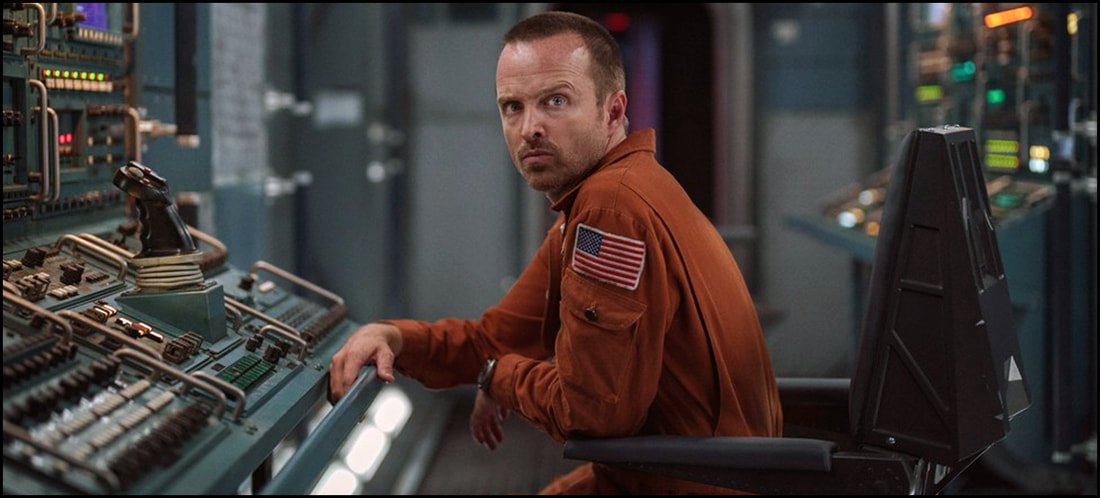From the episode’s IMDB.com page citation:
“In an alternative 1969, two men on a perilous high-tech mission wrestle with the consequences of an unimaginable tragedy.”
As is always the case with any respectable anthology, audiences have to accept the good with the bad. This isn’t in any way meant to imply that some episodes might clearly be inferior; rather, I’m just trying to suggest that even a good idea might come with some bad (or lesser) trappings.
In fact, one could argue that such is the case with any writing. In any given story, viewers are provided a smattering of characters along with a set of circumstances that they have to accept at face value with very little pushback. (Not that the director, screenwriter, and/or actors are listening anyway!) Throughout the experience, we watch for these pieces to successfully complete whatever narrative puzzle has been designed, and we can only hope that – by the big finish – all questions will have been sufficiently answered so that we can then turn to one another right after (or at the water cooler on Monday morning) and properly share our thoughts on the show.
But anthologies do have to work a bit harder, or that’s what I’ve always believed. They’re often tasked in doing more with less – typically, episodes have the feel of a small feature movie but are produced on a fraction of the time and budget – and this can get in the way of achieving the desire results. It ain’t easy being an entertainer, and no one ever said it would be.
So … “Beyond The Sea” earns good marks at creating one of the more thoughtful SciFi scenarios for its slim cast of characters: astronauts Cliff Stanfield (played by Aaron Paul) and David Ross (Josh Hartnett) are sailing into deep space on a mission that never quite gets clearly defined, but – through the advent of some incredible consciousness-swapping technology – they’re also living out mission downtime back home on Earth in their respective robotic counterparts. Essentially, when they’re asleep in the space capsule, they’re living somewhat normal lives back home, both married and with families at different locales in the United States. Who said you couldn’t have it all, eh?
However, regular Earthmen and women aren’t all comfortable with the invention of these synthetic people. Apparently, some minor cults have sprung up to protest the Biblical implications of creating man in our own image; and one sect eventually goes after Ross and his family, massacring the astronaut, his wife, and their two children in an act of homegrown terrorism. With no replica to house his consciousness, the man is forced to live out his days in the cold isolation of distant space with only his waking hours alongside Stanfield for companionship.
Eventually, Stanfield and his wife (back on Earth) come up with an idea they believe might help the victim cope with his mounting grief: Cliff will allow David to ‘step’ into his robotic self for extremely limited sessions, giving him brief opportunities to once again feel the dirt under his feet, breath natural air again, and basically stretch his legs on the big blue marble once more.
Well … you don’t have to be a rocket scientist to see that this solution will likely end not so much ‘badly’ as it does ‘very badly,’ but that’s what audiences have come to expect from anthologies of this type. “Beyond The Sea” isn’t a bad episode in any respect, but it does suffer from an incredible level of predictability. Yes, Ross will be confused by ‘stepping’ into Stanfield’s live. Yes, Lana Stanfield (Kate Mara) will be tempted by the body of her husband now taking an uncharacteristic interest in her sexual and emotional well-being. Yes, Ross might take liberties without Cliff’s knowledge. Yes, it’ll all boil to a head, and even yes … you see what I mean?
Far too much of this journey we’ve seen before, albeit without the SciFi construct and the Space/Earth settings. While the performances are quite good and Charlie Brooker’s script tries to give it a measure of freshness by placing it an alternate universe, I just couldn’t quite get past the fact that it was all so obviously destined for a tragedy of personal destruction that could’ve / would’ve / should’ve been avoided by supposedly smart people.
Black Mirror’s “Beyond The Sea” (S06E03) was produced by Charlie Brooker and company in cooperation with Netflix. The episode is currently available for viewing on the streaming giant. As for the technical specifications? While I’m no trained video expert, I thought the accompanying sights and sounds were exceptional from start-to-finish.
Recommended.
“Beyond The Sea” has an interesting genre hook to make it all possible, one given a smidgen of freshness by setting its events in an alternate version of Earth, circa the late 1960’s. Still, I was never certain enough of just what these two astronauts were doing in the Final Frontier – yes, I wanted to know, mostly because that’s how I’m wired – and the general formulaic approach of both reacting to and creating character conflict has been done before. There were parts I liked and parts I didn’t, but you can’t tell me you didn’t see this ending coming from miles away … unless you weren’t watching.
In the interests of fairness, I’m pleased to disclose that the entire sixth season of Black Mirror is presently available to me as a current Netflix subscriber, and I was provided absolutely no advance screening of any episodes in exchange for a complimentary review.
-- EZ


 RSS Feed
RSS Feed